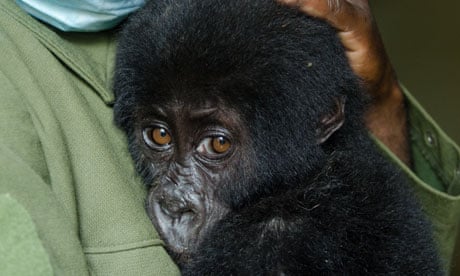A surge in trafficking of baby gorillas is posing a fresh risk to the endangered species in the Democratic Republic of Congo, wildlife officials have warned.
Poachers demanding $40,000 (£25,350) for one of the animals were caught by park rangers earlier this month in an undercover sting operation.
It was the fourth such incident since April, making this a record year for the poachers trying to feed a growing black market caught with baby gorillas.
Mountain gorillas are critically endangered, with around 790 remaining in the world - about 480 in the Virunga volcanoes conservation area (shared by DR Congo, Rwanda and Uganda) and just over 300 in the Bwindi Impenetrable Forest in Uganda. Eastern lowland gorillas are more numerous but largely outside protected areas and still in decline.
Emmanuel de Merode, director of Virunga national park, said: "We are very concerned about a growing market for baby gorillas that is feeding a dangerous trafficking activity in rebel controlled areas of eastern DRC.
"We are powerless to control the international trade in baby gorillas, but our rangers are doing everything they can to stamp it out on the ground." Merode added: "Four baby gorillas seized in less than a year is unusually high … [but] it's only the tip of the iceberg, as we only manage to catch a small proportion of the offenders because the wildlife service is under-resourced in Congo."
An infant gorilla was rescued on 6 October when a team of park rangers went undercover posing as potential buyers in the town of Kirumba, near the western border of the park.
Dressed in civilian clothes, they made contact and agreed a price for the one-and-a-half-year-old male eastern lowland gorilla that poachers were hiding in a small backpack. Rangers arrested the three poachers once they had possession of the gorilla.
Christian Shamavu, the leader of the operation, said: "It's very likely that the mother and other gorillas were killed because it's very difficult to take a baby gorilla from its family. The poachers will never admit to this, though."
Baby eastern lowland gorillas were confiscated from poachers in DR Congo in April and June, and Rwandan police recovered a baby mountain gorilla as poachers attempted to smuggle it over the border in August.
The animals suffer physical anguish during the process. Dr Jan Ramer, a vet with Mountain Gorilla Veterinarian Project (MGVP), partners with Virunga national park, said: "Many of these infants are injured from ropes around their hands, feet or waist, and some are quite ill, which is not surprising as they are generally in close contact with their human captors, extremely stressed, and with very poor nutrition."
But the newest orphan gorilla, named Shamavu after the ranger who rescued him, appears to be in good condition, Ramer added. "He appears to be quite healthy other than some parasites and dry skin."
The market price for infant gorillas can reach $40,000, but officials say they lack the resources or jurisdiction to investigate where the gorillas are headed or who is behind the trafficking.
International experts said they believe the route lies east. Ian Redmond, chairman of the conservation group the Ape Alliance, said: "We think the Middle East is a likely source of demand, wealthy animal collectors and a tradition of giving big gifts to curry favour … and maybe wealthy Russians, but there is little hard evidence.
"What we do know is that just the rumour that someone is looking to buy a baby ape can be enough for penniless hunters to think: 'I could get one of those and sell it for $$$$!' And in eastern DRC, once one is captured it is likely to be smuggled eastwards through either Rwanda or Uganda, the traditional trade routes for all goods in that area."
A report on ape trafficking by Karl Ammann, an investigative film maker, claimed that dozens of gorillas and hundreds and chimpanzees have been taken from Cameroon via Nigeria to Egypt.
Emmanuel de Merode added: "Surveillance is the key, at the borders, in the towns, along the roads. The local community are the best surveillance system, if they are on our side.
"A lot more could be done with respect to international trade, especially in the market countries where there is demand for baby gorillas. There, it's a question of enacting legislation and enforcing. As far as I know, very little has been done that's effective with respect to baby gorilla trafficking."
